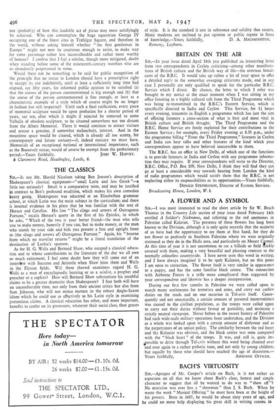A FLOWER AND A SYMBOL
Sift,—I was most interested to read the short article by Sir W. Beach Thomas in the Country Life section of your issue dated February 14th entitled A Soldier's Nickname, and referring to the red anemones in Palestine called Kalariot. The presence of these flowers has long been known to the Division, although it is only quite recently that the majority of us have had the opportunity to see them at first hand, for they do not flower so profusely in Southern Palestine where we were originally stationed as they do in the Haifa area, and particularly on Mount Carmel. At this time of year it is not uncommon to see a hillside or field thickly covered with them, making a very beautiful and pleasing contrast to the normally colourless countryside. I have never seen this word in writing, and I have always imagined it to be spelt Kalaniot, but on this point I am open to correction. The flower itself is very similar in appearance to a poppy, and has the same familiar black centre. The connection with Airborne Forces is a trifle more complicated than suggested by your correspondent and likewise has a deeper interpretation.
During our first few months in Palestine we were called upon to search many settlements for terrorists and arms, and carry out curfew duties on the roads and on one occasion in Tel-aviv itself. Conse- quently and not unnaturally, a certain amount of personal inconvenience was caused to the civilian population, as the troops were called upon to carry out their duties without favour or partiality, and maintain a strictly neutral viewpoint. Never before in the recent history of Palestine had such wide-scale military operations been undertaken, and the Division as a whole was looked upon with a certain amount of disfavour and as the perpetrators of an unjust policy. The similarity between the red beret and the Kalaniot was obvious, and the black centre was soon compared with the " black heart" of the troops. It was, and still is, quite im- d? ossible to drive through Tel-sviv without this word being chanted over and over again to a rather pathetic tune, and not only by young children, but equally by those who should have reached the age of discretion.—


































 Previous page
Previous page